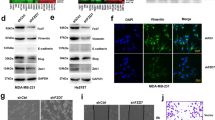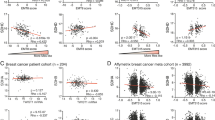Abstract
Tumor stem cell theory may well explain a variety of malignant behaviors of tumors. Cells undergoing epithelial-mesenchymal transition (EMT) share many characteristics with tumor stem cells. Our previous studies showed that extracellular -5'- nucleotidase (CD73), one of the important surface markers of mesenchymal stem cells, may promote growth and metastasis of breast cancer cells both in vivo and in vitro. In this study, we assessed breast cancer stem cell (BCSC) markers [acetaldehyde dehydrogenase (ALDH)+ and CD44+CD24−] in various breast cancer cell lines with flow cytometry after overexpression (by lentivirus infection) or suppression (by siRNA interference) of CD73. We measured CD73 expression in breast cancer mammospheres with real-time PCR and western blots. Finally, we examined the expression of CD73 and EMT markers in different breast cancer cell lines, as well as in mammary cells (MCF10A) that underwent EMT induced by transforming growth factor beta (TGF-β). We found that CD73 positively correlated with ALDH+ or CD44+CD24− subsets of breast cancer cells. CD73 was expressed more in breast cancer mammospheres than in adherent cells. CD73 and mesenchymal marker expression was higher in breast cancer cells with more malignant features, while CD73 was lower in low malignant breast cancer cells with higher epithelial markers. Furthermore, CD73 expression increased during the process of TGF-β-induced EMT. Our results indicate that CD73 may play an important role in BCSCs.




Similar content being viewed by others

References
Al-Hajj M, Wicha MS, Benito-Hernandez A, Morrison SJ, Clarke MF (2003) Prospective identification of tumorigenic breast cancer cells. Proc Natl Acad Sci U S A 100:3983–3988
Aliagas E, Vidal A, Texidó L, Ponce J, Condom E, et al. (2014) High expression of ecto-nucleotidases CD39 and CD73 in human endometrial tumors. Mediat Inflamm 2014:509027
Allard B, Pommey S, Smyth MJ, Stagg J (2013) Targeting CD73 enhances the antitumor activity of anti-PD-1 and anti-CTLA-4 mAbs. Clin Cancer Res 19:5626–5635
Allard B, Turcotte M, Spring K, Pommey S, Royal I, et al. (2014) Anti-CD73 therapy impairs tumor angiogenesis. Int J Cancer 134:1466–1473
Beavis PA, Divisekera U, Paget C, Chow MT, John LB, et al. (2013) Blockade of A2A receptors potently suppresses the metastasis of CD73+ tumors. Proc Natl Acad Sci U S A 110:14711–14716
Bonnet D, Dick JE (1997) Human acute myeloid leukemia is organized as a hierarchy that originates from a primitive hematopoietic cell. Nat Med 3:730–737
Calloni R, Cordero EA, Henriques JA, Bonatto D (2013) Reviewing and updating the major molecular markers for stem cells. Stem Cells Dev 22:1455–1476
Cojoc M, Mäbert K, Muders MH, Dubrovska A (2014) A role for cancer stem cells in therapy resistance: cellular and molecular mechanisms. Semin Cancer Biol 31:16–27
Creighton CJ, Chang JC, Rosen JM (2010) Epithelial-mesenchymal transition (EMT) in tumor-initiating cells and its clinical implications in breast cancer. J Mammary Gland Biol Neoplasia 15:253–260
Deaglio S, Robson SC (2011) Ectonucleotidases as regulators of purinergic signaling in thrombosis, inflammation, and immunity. Adv Pharmacol 61:301–332
Derynck R, Muthusamy BP, Saeteurn KY (2014) Signaling pathway cooperation in TGF-β-induced epithelial-mesenchymal transition. Curr Opin Cell Biol 31C:56–66
DeSantis CE, Lin CC, Mariotto AB, Siegel RL, Stein KD, et al. (2014) Cancer treatment and survivorship statistics, 2014. CA Cancer J Clin 64:252–271
Duan JJ, Qiu W, Xu SL, Wang B, Ye XZ, et al. (2013) Strategies for isolating and enriching cancer stem cells: well begun is half done. Stem Cells Dev 22:2221–2239
Fan L, Strasser-Weippl K, Li JJ, St Louis J, Finkelstein DM, et al. (2014) Breast cancer in China. Lancet Oncol 15:e279–e289
Fantozzi A, Gruber DC, Pisarsky L, Heck C, Kunita A, et al. (2014) VEGF-mediated angiogenesis links EMT-induced cancer stemness to tumor initiation. Cancer Res 74:1566–1575
Fillmore CM, Kuperwasser C (2008) Human breast cancer cell lines contain stem-like cells that self-renew, give rise to phenotypically diverse progeny and survive chemotherapy. Breast Cancer Res 10:R25
Friedmann-Morvinski D, Verma IM (2014) Dedifferentiation and reprogramming: origins of cancer stem cells. EMBO Rep 15:244–253
Gudadze M, Kankava Q, Mariamidze A, Burkadze G (2014) Features of CD44+/CD24-low phenotypic cell distribution in relation to predictive markers and molecular subtypes of invasive ductal carcinoma of the breast. Georgian Med News 228:81–87
Häusler SF, Del Barrio IM, Diessner J, Stein RG, Strohschein J, et al. (2014) Anti-CD39 and anti-CD73 antibodies A1 and 7G2 improve targeted therapy in ovarian cancer by blocking adenosine-dependent immune evasion. Am J Transl Res 6:129–139
Hirschhaeuser F, Menne H, Dittfeld C, West J, Mueller-Klieser W, et al. (2010) Multicellular tumor spheroids: an underestimated tool is catching up again. J Biotechnol 148:3–15
Horenstein AL, Chillemi A, Zaccarello G, Bruzzone S, Quarona V, et al. (2013) A CD38/CD203a/CD73 ectoenzymatic pathway independent of CD39 drives a novel adenosinergic loop in human T lymphocytes. Oncoimmunology 2:e26246
Kothari AN, Mi Z, Zapf M, Kuo PC (2014) Novel clinical therapeutics targeting the epithelial to mesenchymal transition. Clin Transl Med 3:35
Kreso A, Dick JE (2014) Evolution of the cancer stem cell model. Cell Stem Cell 14:275–291
Lamouille S, Xu J, Derynck R (2014) Molecular mechanisms of epithelial-mesenchymal transition. Nat Rev Mol Cell Biol 15:178–196
Liu Y, Nenutil R, Appleyard MV, Murray K, Boylan M, et al. (2014) Lack of correlation of stem cell markers in breast cancer stem cells. Br J Cancer 110:2063–2071
Loi S, Pommey S, Haibe-Kains B, Beavis PA, Darcy PK, et al. (2013) CD73 promotes anthracycline resistance and poor prognosis in triple negative breast cancer. Proc Natl Acad Sci U S A 110:11091–11096
Mallini P, Lennard T, Kirby J, Meeson A (2014) Epithelial-to-mesenchymal transition: what is the impact on breast cancer stem cells and drug resistance. Cancer Treat Rev 40:341–348
Mani SA, Guo W, Liao MJ, Eaton EN, Ayyanan A, et al. (2008) The epithelial-mesenchymal transition generates cells with properties of stem cells. Cell 133:704–715
Marcato P, Dean CA, Giacomantonio CA, Lee PW (2011a) Aldehyde dehydrogenase: its role as a cancer stem cell marker comes down to the specific isoform. Cell Cycle 10:1378–1384
Marcato P, Dean CA, Pan D, Araslanova R, Gillis M, et al. (2011b) Aldehyde dehydrogenase activity of breast cancer stem cells is primarily due to isoform ALDH1A3 and its expression is predictive of metastasis. Stem Cells 29:32–45
Nakaya Y, Sheng G (2013) EMT in developmental morphogenesis. Cancer Lett 341:9–15
O’Connor ML, Xiang D, Shigdar S, Macdonald J, Li Y, et al. (2014) Cancer stem cells: a contentious hypothesis now moving forward. Cancer Lett 344:180–187
Phillips TM, McBride WH, Pajonk F (2006) The response of CD24(−/low)/CD44+ breast cancer-initiating cells to radiation. J Natl Cancer Inst 98:1777–1785
Puisieux A, Brabletz T, Caramel J (2014) Oncogenic roles of EMT-inducing transcription factors. Nat Cell Biol 16:488–494
Reiman JM, Knutson KL, Radisky DC (2010) Immune promotion of epithelial-mesenchymal transition and generation of breast cancer stem cells. Cancer Res 70:3005–3008
Serra S, Horenstein AL, Vaisitti T, Brusa D, Rossi D, et al. (2011) CD73-generated extracellular adenosine in chronic lymphocytic leukemia creates local conditions counteracting drug-induced cell death. Blood 118:6141–6152
Steinestel K, Eder S, Schrader AJ, Steinestel J (2014) Clinical significance of epithelial-mesenchymal transition. Clin Transl Med 3:17
Terp MG, Olesen KA, Arnspang EC, Lund RR, Lagerholm BC, et al. (2013) Anti-human CD73 monoclonal antibody inhibits metastasis formation in human breast cancer by inducing clustering and internalization of CD73 expressed on the surface of cancer cells. J Immunol 191:4165–4173
Tirino V, Desiderio V, Paino F, De Rosa A, Papaccio F, et al. (2013) Cancer stem cells in solid tumors: an overview and new approaches for their isolation and characterization. FASEB J 27:13–24
Vicente-Dueñas C, Hauer J, Ruiz-Roca L, Ingenhag D, Rodríguez-Meira A et al (2014) Tumoral stem cell reprogramming as a driver of cancer: Theory, biological models, implications in cancer therapy. Semin Cancer Biol 32:3–9
Vidal SJ, Rodriguez-Bravo V, Galsky M, Cordon-Cardo C, Domingo-Domenech J (2014) Targeting cancer stem cells to suppress acquired chemotherapy resistance. Oncogene 33:4451–4463
Wang L, Tang S, Wang Y, Xu S, Yu J, et al. (2013) Ecto-5′-nucleotidase (CD73) promotes tumor angiogenesis. Clin Exp Metastasis 30:671–680
Wang L, Zhou X, Zhou T, Ma D, Chen S, et al. (2008) Ecto-5′-nucleotidase promotes invasion, migration and adhesion of human breast cancer cells. J Cancer Res Clin Oncol 134:365–372
Yang Q, Du J, Zu L (2013) Overexpression of CD73 in prostate cancer is associated with lymph node metastasis. Pathol Oncol Res 19:811–814
Yang J, Weinberg RA (2008) Epithelial-mesenchymal transition: at the crossroads of development and tumor metastasis. Dev Cell 14:818–829
Zhi X, Chen S, Zhou P, Shao Z, Wang L, et al. (2007) RNA interference of ecto-5′-nucleotidase (CD73) inhibits human breast cancer cell growth and invasion. Clin Exp Metastasis 24:439–448
Zhi X, Wang Y, Yu J, Zhang L, Yin L, et al. (2012) Potential prognostic biomarker CD73 regulates epidermal growth factor receptor expression in human breast cancer. IUBMB Life 64:911–920
Zhi X, Wang Y, Zhou X, Yu J, Jian R, et al. (2010) RNAi-mediated CD73 suppression induces apoptosis and cell-cycle arrest in human breast cancer cells. Cancer Sci 101:2561–2569
Zhou P, Zhi X, Zhou T, Chen S, Li X, et al. (2007a) Overexpression of ecto-5′-nucleotidase (CD73) promotes T-47D human breast cancer cells invasion and adhesion to extracellular matrix. Cancer Biol Ther 6:426–431
Zhou X, Zhi X, Zhou P, Chen S, Zhao F, et al. (2007b) Effects of ecto-5′-nucleotidase on human breast cancer cell growth in vitro and in vivo. Oncol Rep 17:1341–1346
Acknowledgments
This research was supported by grants from the Natural Science Foundation of China (81172507). The authors thank Shuhui Sun and Guoping Zhang from institutes of Biomedical Sciences, Fudan University, Shanghai, China, for their guide in flow cytometry. The authors thank Zhouluo Ou from Fudan University Shanghai Cancer Center, Shanghai, China and Xueqing Sun from Department Of Biochemistry, Shanghai Jiao Tong University School of Medicine, Shanghai, China, for their help in cells culture.
Author information
Authors and Affiliations
Corresponding author
Ethics declarations
Conflict of interest
The authors declare that they have no conflict of interest.
Additional information
Editor: Tetsuji Okamoto
This study was funded by the National Natural Science Fund Project (81172507)
Rights and permissions
About this article
Cite this article
Yu, J., Liao, X., Li, L. et al. A preliminary study of the role of extracellular -5′- nucleotidase in breast cancer stem cells and epithelial-mesenchymal transition. In Vitro Cell.Dev.Biol.-Animal 53, 132–140 (2017). https://doi.org/10.1007/s11626-016-0089-y
Received:
Accepted:
Published:
Issue Date:
DOI: https://doi.org/10.1007/s11626-016-0089-y



